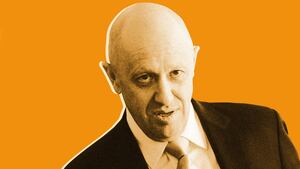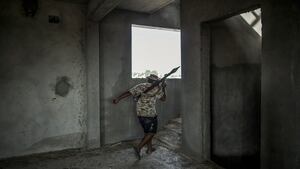In the last two years Yevgeny Prigozhin, working through a series of cut-outs and front organizations, has partnered with a host of racist and fascist activists in Europe to stir up, of all things, purportedly anti-colonialist politics in sub-Saharan Africa.
The oligarch coyly referred to in the international media as “Putin’s chef” but identified by the U.S. and European governments as a well-heeled emissary of the Kremlin, Prigozhin has been here, there and everywhere, interfering in democratic elections and deploying his “Wagner” mercenary forces to fight in undeclared Russian wars all over the world. He’s been serially sanctioned by the Treasury Department, not least for his sponsorship of the social media component of Russia’s interference campaign in the 2016 U.S. presidential contest. And while active measures of his unnamed organization in a primarily Black continent have been engineered to whip up anti-Western and pro-Russian sentiment, they have bizarrely relied on a bevy of foreign extremists with long, documented histories of white supremacism, anti-Semitism, or both.
Among them are the managers of a network of far-right websites and magazines, members of Germany’s xenophobic Alternative für Deutschland (AfD) party, a Belgian political activist mentored by a former Waffen SS member, and a pair of Swedes who’ve spent years promoting the myth of a white genocide.
All have variously appeared as “electoral observers,” editorial writers, TV show guests, panelists in roundtable meetings and speakers at conferences in Zimbabwe and South Africa, forming a key part of the Kremlin’s influence network in Africa. They work primarily through the Association for Free Research and International Cooperation (AFRIC), one of Prigozhin’s many front organizations.
AFRIC did not respond to a request for comment. Founded in 2018, the organization bills itself publicly as a “a community of independent researchers, experts and activists” with a sideline in election monitoring. In reality, it operates like a private intelligence service and political pressure group, whose core mission, as it internally acknowledges, is to sway elections on behalf of pro-Russian candidates.
Remarkably candid PowerPoints dated April 2018 and shared with The Daily Beast by the London-based Dossier Center show that AFRIC was conceived as an “instrument of soft power influencing international organizations and media in the name of a community of independent experts.” AFRIC, one slide announces, is a “network of agents of influence” paid in untraceable forms of cryptocurrency to provide “expert evaluations and opinions beneficial to Russia.” It recruits and compensates local African activists, all while keeping their Russian underwriter hidden.

In slide labeled “Advantages,” the organization highlights its plausibly deniable provenance and even resorts to terminology more akin to espionage than NGO work: “‘Cover’ and legend for conducting activities,” “Anonymity,” “No need to register a legal entity,” and “No need for a public leader.”

AFRIC appears to be stage-managed by a well-known Prigozhin operative, Yulia Afanasyeva, who works for the Africa “back-office” of the oligarch’s organizational headquarters in St. Petersburg. AFRIC may claim to have no need for a “public leader” but it does have a low-profile president, José Matemulane, a Mozambique-born academic, formerly assistant professor at the Mozambique Pedagogical University in Quelimane. Matemulane received his PhD in psychology from the St. Petersburg State University and his social media presence is rife with praise for Putin and the Russian Defense Ministry.
Prigozhin’s gambit is part of a century-long Russian battle for influence in Africa, even if its “active measures” there haven’t always worked to its advantage. As historian Christopher Andrew and former KGB archivist Vasili Mitrokhin have noted, all the way back in 1900, Iskra, Lenin’s revolutionary communist newspaper, mentioned South Africa as a prime target for a workers’ revolt owing to its relative industrialization. Expectations were dashed. In the 1930s, Black Communist delegates who had come to Moscow to study at Comintern-run schools complained that, despite a shared ideology, the Soviet Union was awash with racism. According to Andrew and Mitrokhin, several of these students, including Jomo Kenyatta, later the first indigenous leader of Kenya, even signed a letter “complaining of the ‘derogatory portrayal of Negroes in the cultural institutions of the Soviet Union’ as ‘real monkeys.’”
Nikita Khrushchev amped up efforts by riding the tide of African nationalism and anti-colonialism, first against the U.K. and France, and then Belgium, in the 1950s.
Vladimir Putin, of course, is less interested in anti-colonialism as a sidecar ideology to Marxist revolution. It’s just a good business strategy: a cudgel to be used against real or imagined Western competitors, even if those assigned to wield it think colonialism didn’t go quite far enough. The Kremlin offers a suite of service for any and all stakeholders: consultants, pollsters, friendly media outlets, and, should push come to shove, as in Libya and the Central African Republic, weapons and mercenaries. In return, Moscow gets new allies, military footholds, and valuable extractive contracts.
One of the first countries in which AFRIC plied its trade was the island nation of Madagascar, off the eastern coast of Africa, which held a presidential election in 2018. Incumbent Hery Rajaonarimampianina thought he had Moscow’s full backing after an apparently successful meeting with Putin in Moscow in March of that year. He was wrong.
Multiple teams of the Prigozhin organization’s operatives approached and recruited (or tried to recruit) virtually every candidate running for the Malagasy presidency, offering money or campaign consultancy services or both. As The Daily Beast previously reported about Prigozhin’s intervention in Libya, he likes to hedge his bets and work with many different actors in a single country, even if they’re working at political cross-purposes with, or even killing, one another.
The aim is not necessarily to decide who wins, but to entice and secure a relationship with whoever does. The Prigozhin organization’s modus operandi means mercenaries, armaments, “consultants” and media platforms come in exchange for lucrative natural resources contracts.
Prigozhin-linked front companies have been created to generate contracts in extractives—gold, diamonds, oil, gas or precious metals—which funnel money back to Russia. This kind of deal has already been confirmed in the Central African Republic, Sudan, and Burundi, as well as Madagascar.
In the battle to secure relationships with multiple candidates in Madagascar, AFRIC hosted two prominent “forums” pertaining to the upcoming election. One platformed several of the Malagasy candidates, the majority of whom had already been promised the services of the Prigozhin organization; the second was hosted in conjunction with pan-African TV channel Afrique Media.
As Anton Shekhovtsov, a Vienna-based scholar of the European far-right, observed, both events featured Kémi Séba, a French-Beninese anti-Semite who used them as opportunities to denounce French colonialism and demand that Paris relinquish control of the disputed Scattered Islands in the Indian Ocean. “France, get out of our territories, you have no right to be there!” Séba shouted at the second forum. Then, somewhat letting the mask slip, he suggested: “Africans have more trust in Russia than in the U.S. or France.”
That’s certainly true of Séba. In 2006, following a march targeting Le Marais, Paris’ Jewish quarter, his quasi-religious “sect” Tribu KA was proscribed on grounds of anti-Semitism by the French government. He was subsequently convicted of inciting racial hatred.
In 2017, a year before his antics in Madagascar, Séba travelled to Moscow where he met with Aleksandr Dugin, Russia’s foremost fascist philosopher, who believes in the restoration of an ethnically pure Russian empire, and has aligned with and influenced any number of far-right parties and groups throughout Europe. Dugin would go on to write a preface to Séba’s book, L’Afrique Libre ou la Mort, which translates as ‘Free Africa or Death.’
A day after delivering his imprecations at the Afrique Media forum, Séba attended a “protest” in front of the French embassy in Antananarivo, the Malagasy capital. Subsequent reporting revealed the whole thing was a piece of theater paid for by Prigozhin’s operatives.
AFRIC has been equally busy in Zimbabwe, particularly since the coup that overthrew Robert Mugabe in November 2017. Prigozhin’s entanglements in that country followed official Russian government outreach, such as the March 2018 visit Foreign Minister Sergei Lavrov paid to acting President Emmerson Mnangagwa in Harare. In June 2018, Valentin Bianki, one of the oligarch’s operatives, was sent to Zimbabwe to help orchestrate Mnangagwa’s first election.
Zimbabwe is still an authoritarian state, so the election was never genuinely competitive. AFRIC’s purpose there was not to influence the outcome so much as lend a veneer of legitimacy to the victor and, of course, to bolster Russian relations with the regime.
Once again, the messaging veered from purely domestic considerations into anti-Western filips, with the acting president’s opposition portrayed as hirelings of the U.S. and UK, which sought to “colonize” Zimbabwe again and “bleed [its] resources dry.”
AFRIC arrived after Bianki did to “observe” the vote. Part of its delegation included some rather counterintuitive monitors given the history of Zimbabwe: a pair of Swedish racists, Sanna Hill and Vávra Suk, as well as Volker Tschapke of the conservative, pro-Russian Prussian Society, and Dragana Trifkovic, a leading member of Serbia’s ultra-nationalist Dveri, a political party which certainly wouldn’t have welcomed a complementary Zimbabwe delegation to Serbia. (Dveri launched a xenophobic anti-immigration campaign earlier this year, with party leader Bosko Obradovic pouring dark liquid into a glass of water in a video to illustrate the supposed effects of immigration into the Balkan state.)
Despite the fact that AFRIC endorsed the Zimbabwe election as “transparent, competitive, and legitimate,” while pointedly promoting the narrative that the Anglo-Americans were seeking to undermine Mnagagwa and his party, Suk went off-script just days after the second round of voting. He published a piece in the far-right Swedish magazine New Times, titled, “Farmers—Zimbabwe is a racist one-party state created by the West.” Whites, Suk insisted, were under siege from the African National Union—Patriotic Front, inconveniently Mnagagwa’s party, which won the election.
Suk is no recent convert to fretting about the alleged extermination of whites. In 2005, he was a featured speaker at former KKK Grand Wizard David Duke’s European American Conference in New Orleans, the theme of which, according to the Anti-Defamation League, was “the unification of Europeans and Americans in opposition to Jews, who were demonized as blood suckers and parasites who dominate media and government around the world.”
Suk has also palled around with Afrikaner white supremacists, writing of a whites-only enclave outside Pretoria that “a drawback is that the Blacks increase in number much faster.”
For all that, AFRIC was evidently unfazed by the Scandinavian’s bit of rogue Aryan punditry. A month after the Zimbabwe election, it published a report from Suk detailing his visit to meet with Syrian regime officials in Damascus along with his fellow Swede and publishing partner Sanna Hill.
AFRIC would go on to offer its bespoke political consultancy services to a party most famously associated with the struggle against apartheid, Nelson Mandela’s African National Congress (ANC).
An investigation by the Dossier Center and South African online newspaper Daily Maverick found that AFRIC and the International Anticrisis Center, another arm of the Prigozhin Organization, had put together a strategy proposal for the ANC, including offers of campaigns to discredit the opposition parties ahead of the 2019 general election.
Dragana Trifkovic and Volker Tschapke have been identified in the small number of photos released from the mission to observe the election in South Africa. Internal budget reports from AFRIC, obtained by the Dossier Center, indicate that observers had also traveled from Sweden, although The Daily Beast could not find any visual or documentary evidence that Suk and Hill had been part of the South Africa delegation. Whether he traveled or not, Suk once again took a slight detour from AFRIC’s official line. Free West Media, a far-right online portal he and Hill jointly maintain, published an unsigned editorial denouncing the “fabricated consensus” for the ANC, an “ex-terrorist organization.”
The editorial certainly conforms to Hill’s longstanding views about South Africa’s political trajectory, post-apartheid. In 2011, then only 20 years old but already an elected city council deputy in the Swedish city of Södertälje, she promoted the conspiracy theory that “there is a genocide going on in South Africa” against the white minority population. The primary agent of it was “forced multiculturalism” and Sweden, she darkly intoned, was doing everything “to become like Africa.”
Her Instagram profile doesn’t leave much mystery as to where Hill’s ideological centers of gravity now lie. She lists herself as the “Nationalist Foreign Correspondent and Deputy Editor in Chief of New Times,” with the Swedish, Syrian and Russian flag emojis dotting this impressive résumé .
Neither Suk nor Hill responded to The Daily Beast’s request for comment.
While the Prigozhin network has, true to form, utilized a vast web of fake Facebook and WhatsApp accounts to promote Russian interests, AFRIC has rather more substantial support from a number of pre-existing media networks. Two of the most prominent are Radio Revolution Panafricaine (or 2RP) and Afrique Media, which helped organize the conference where Kemi Séba called for the expulsion of French influence from the Scattered Islands. Both outlets regularly promote and then cover AFRIC conferences and missions, making up the bulk of sympathetic reporting on the group. They even published identical articles in July of this year, vitriolically denouncing U.S. Representative Eliot Engel for having pushed for sanctions against Prigozhin and claiming, somewhat implausibly, that his views on the oligarch are what led to the Democrat’s primary defeat in July.
Afrique Media was reportedly founded with money from Teodoro Obiang Nguemo, the kleptocratic president of Equatorial Guinea, who was once declared by state radio to be “like God in heaven” with the power “to kill without anyone calling him to account.” According to human rights monitors, he runs one of the most corrupt and oppressive regimes in the world.
Obiang has funded a number of similar media ventures, and the location of 2RP’s headquarters in Malabo, plus the fact that the outlet refers to him as “the great panafricanist,” suggests both of AFRIC’s champions are backed by the dictator.
The likely link between the Prigozhin organization and Obiang’s media efforts is a relatively obscure Belgian named Luc Michel. Physically resembling a Bond villain, with his penchant for grey Nehru jackets, Michel was mentored by former Waffen SS member Jean-Francois Thiriart and joined the neo-Nazi Federation d’Action Nationale et Europeene (FANE) group before setting up his own National-European Communitarian Party in the 90s.
Having long participated in Russian information operations, including organizing bogus electoral observation trips to provide the veneer of approval to the “referendum” held in Crimea following the takeover by Russian forces in 2014, Michel has been operating in Africa for several years now. He’s built up a number of apparently close relationships with authoritarian leaders as an adviser, most notably Obiang and Pierre Nkurunziza , the now-deceased president of Burundi.
Michel, who, like Séba, also combines messages of pan-Africanism with anti-Semitism (couched as anti-Zionism) seems to have been involved with Afrique Media since at least February 2014, and appears on the channel at least once or twice a week as a talking head or a contributor.
This is only one of a dozens of media outlets apparently run by Michel, with others including La Voix de la Guinée Equatoriale, PanAfricom-TV, WebTV-Tchad and Centrafrica News.
Michel is also connected to a Cairo-based television station called TV Jamahiriya, a vestige of Muammar Gaddafi’s state media apparatus in Libya, whose website homepage links directly to one of Michel’s front groups.
As The Daily Beast reported last year, TV Jamahiriya was resuscitated by the Prigozhin organization as part of an effort to promote the image of Gaddafi’s son, Saif al-Islam. All of the channel’s debts were paid off and the Russians trained and equipped the broadcast staff. A similar process appears to have taken place at Afrique Media, which reportedly received Russian investment, including agreements to take on costs, retrain staff and provide production assistance, in 2019.
Yet another connection between both sets of Prigozhin-friendly media operations is Stefan Keuter, a member of the Bundestag in the AfD, who appeared as a guest on TV Jamahiriya in March this year. Keuter was a speaker at two conferences organized recently by AFRIC. The first, in Berlin this January, was presided over by Prigozhin’s media man Aleksandr Malkevich, who was placed on the U.S. sanctions list for his role in spreading disinformation during the 2016 U.S. presidential election. Gunnar Lindemann, another AfD member who praised Russia for not being “an immigration country in the sense that Africans or Arabs immigrate,” was in attendance.










